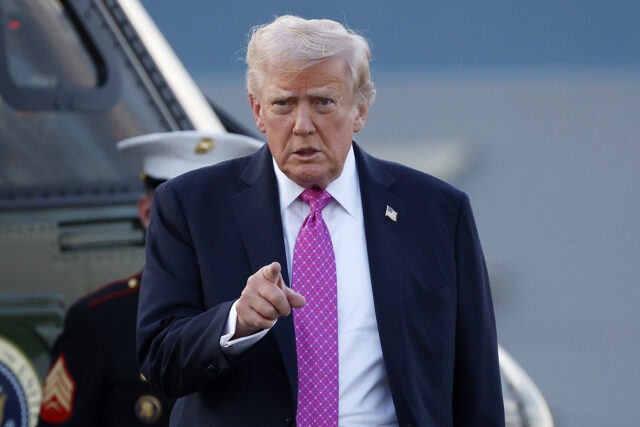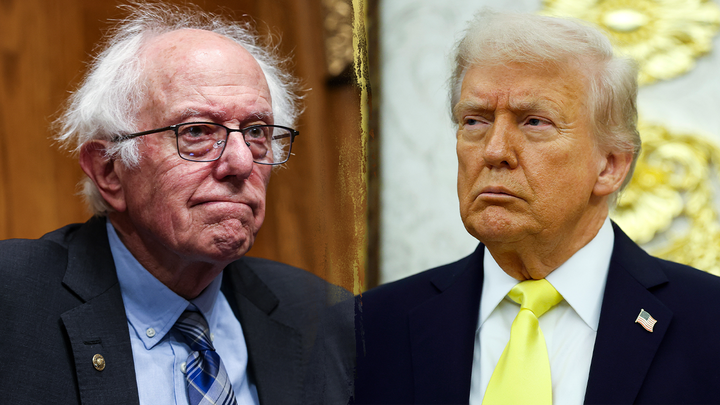President Trump’s aggressive use of tariffs has reshaped conservative economic thought, securing broad backing from Republican voters, according to a new Economist/YouGov poll. The poll reveals a dramatic shift within the GOP on trade, a transformation that would have been unimaginable just a generation ago.
The survey, conducted between October 17-20, shows that roughly two-thirds of Trump voters and Republicans support maintaining or increasing current tariff levels, signaling a sharp departure from the free trade policies that once dominated the party. Among conservatives, 62% back maintaining or raising tariffs, highlighting a significant embrace of Trump’s protectionist policies.
Even more striking is the support for a 100% tariff on all Chinese goods, with 59% of Trump voters backing the move, effectively doubling the cost of Chinese products. Overall, 58% of Republicans support this drastic measure, reflecting a hardening stance against China. Among conservatives, 56% support the 100% tariff, underscoring how deeply entrenched these views have become within the right.
A New GOP Consensus
Trump’s trade policies, once controversial even within his own party, have now become orthodoxy on the right. Eighty percent of Republicans approve of Trump’s handling of foreign trade, with nearly half expressing strong approval. The poll shows that the GOP is no longer the party of free trade advocates like the ones who championed NAFTA in the 1990s. Now, it’s a party that largely supports tariffs as a means to protect American industry and workers.
The timing of this shift is significant. By October 2025, Trump had already implemented sweeping tariff increases, especially on Chinese imports. When respondents in the poll said they wanted tariffs to "stay the same," they were endorsing these elevated levels, not returning to pre-Trump trade policies.
Among Trump voters, 23% want tariffs raised further, while 43% want them maintained at current levels. Only 20% of Trump voters want tariffs reduced. Similarly, across conservatives and Republicans, the vast majority favor maintaining or increasing tariffs.
The China Factor
The poll reveals a particularly hawkish view of China among Republicans. A striking 82% of Republicans view China as either “unfriendly” (31%) or an outright “enemy” (47%) of the United States. Among Trump voters, 45% see China as an enemy, with another 36% considering it unfriendly. Only 10% of Trump voters view China as an ally or friendly.
This animosity toward Beijing seems to drive the strong support for tariffs, particularly against Chinese goods. The poll shows 56% of conservatives and 58% of Republicans support imposing a 100% tariff on Chinese imports. These findings reflect a growing consensus that China represents a major threat, economically and geopolitically, to the U.S.
Breaking With GOP Tradition
The embrace of tariffs marks a fundamental break with decades of GOP orthodoxy. Historically, Republican leaders championed free trade agreements, believing that lowering trade barriers would benefit American consumers and businesses. This view dominated the party’s economic policies until Trump’s rise. Even in 2016, Trump’s trade skepticism was seen as an outlier within the GOP, with his primary opponents attacking him for being economically illiterate.
However, Trump’s victories in Rust Belt states like Pennsylvania, Michigan, and Wisconsin—many of which were attributed to his protectionist stance—forced the GOP to reconsider its trade policies. Today, the party’s base has largely rallied behind Trump’s economic nationalism, viewing tariffs as necessary to secure American manufacturing and jobs.
Global Engagement and Economic Nationalism
Despite the strong support for tariffs, Republicans do not appear to be advocating for complete isolationism. The poll shows that Trump voters (77%) and Republicans (79%) believe America’s international standing has improved since Trump took office, and a majority favor active U.S. involvement in world affairs. However, this engagement is more selective, with Republicans preferring economic confrontations with rivals like China and more favorable trade agreements, rather than bureaucratic diplomatic initiatives or multilateral institutions.
A Durable Shift in GOP Economics
The widespread backing for tariffs within the Republican Party suggests that this shift in trade policy may outlast Trump’s presidency. Even moderate Republicans and conservatives who may disagree with other aspects of Trump’s agenda have come around to support his trade policies. Among Republicans, only 14% disapprove of Trump’s trade policies, and among conservatives, only 18% oppose them.
This realignment signals a long-term transformation in the GOP, one that harkens back to the party’s roots in economic nationalism. From the Civil War through the early 20th century, the Republican Party was the principal defender of tariffs as a means of promoting industrial growth, higher wages, and national self-sufficiency. Under Trump, the GOP has returned to this tradition, positioning tariffs as tools for protecting American workers and industries.
In the eyes of Republicans and conservatives, Trump has successfully “made tariffs great again.” This shift in trade policy not only reflects a broader economic strategy but also represents a significant redefinition of what it means to be a conservative in the modern age.


